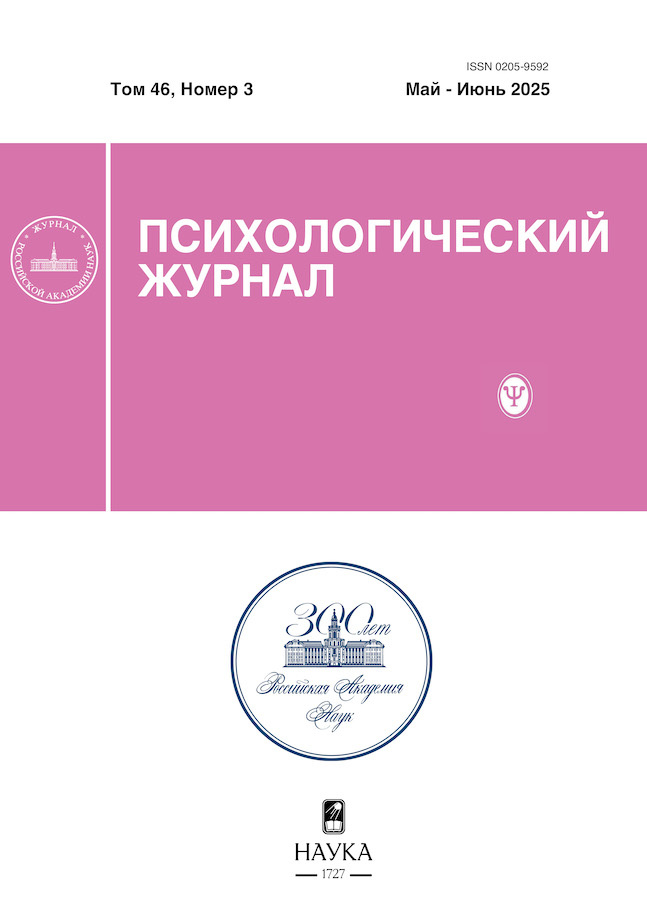The attitude of men and women to social interaction in the family sphere, taking into account the gender personality type
- Authors: Titova O.I.1,2, Poznyakov V.P.3
-
Affiliations:
- Siberian Law Institute of the MIA of Russia
- V.P. Astafiev Krasnoyarsk State Pedagogical University
- Institute of Psychology of the Russian Academy of Sciences
- Issue: Vol 46, No 3 (2025)
- Pages: 36-46
- Section: Social psychology
- URL: https://cijournal.ru/0205-9592/article/view/688374
- DOI: https://doi.org/10.31857/S0205959225030048
- ID: 688374
Cite item
Abstract
In modern society, the family sphere is undergoing changes, including the interaction of men and women. For the first time, the relationship of men and women to social interaction in the family sphere is studied, taking into account the gender type defined by the author’s typology (patriarchal-polarized, patriarchal-similarative, egalitarian-polarized and egalitarian-similarative). The purpose of the study was to study the peculiarities of the relationship between men and women to social interaction, the main area of which is the family, considering the gender personality type. It was assumed that men and women, whose main sphere of interaction is the family, belonging to the same gender type, differ in their attitude to social interaction. The study used the author’s gender personality type questionnaire and a questionnaire on attitudes to social interaction. The sample consisted of 317 people (18–70 years old, 82.5% of them aged 21–40 years; 37% men, 63% women). Mathematical processing methods: descriptive statistics, step-by-step discriminant analysis (IBM SPSS 27.0), Cohen’s coefficient. Attitudes towards social interaction among men and women, representatives of the studied gender types, whose main sphere of interaction is the family, have significant differences in how different different spheres of life (family, work, leisure) are perceived; whether there is competition in relationships; how often interaction is based on morality and trust; how the subject treats generally accepted norms; how spontaneous and situational his interaction is; whether the subject takes into account the relationship with a specific person. The results of the study indicate that there are differences between men and women with the same gender type in their attitude to social interaction, the main sphere of which is the family. There is an increase in the number of differences as beliefs about the polarization of psychological characteristics of men and women increase, but only among representatives of “patriarchal” gender types. There are differences in the attitudes of men and women to social interaction that do not depend on the gender type and are also characteristic of representatives of different gender types, regardless of their gender. They are related to the parameters of interaction: the frequency of the subject’s orientation towards his own interests, the degree of activity, pragmatism, striving for equality, justice and willingness to submit. The results can be used in counseling and psychological education.
Full Text
About the authors
O. I. Titova
Siberian Law Institute of the MIA of Russia; V.P. Astafiev Krasnoyarsk State Pedagogical University
Author for correspondence.
Email: 944058@mail.ru
PhD (Psychology), Docent of the Department of Humanities and Socio-Economic Disciplines, Docent of the Department of Psychology
Russian Federation, 660131, Krasnoyarsk, Rokossovsky st., 20; 660049, Krasnoyarsk, Ada Lebedeva str., 89V. P. Poznyakov
Institute of Psychology of the Russian Academy of Sciences
Email: pozn_v@mail.ru
ScD (Psychology), Chief Scientific Officer
Russian Federation, 129366, Yaroslavskaya str., 13 MoscowReferences
- Bim-Bad B.M., Gavrov S.N. Modernizacija instituta sem’i: sociologicheskij, jekonomicheskij i antropologo-pedagogicheskij analiz. Moscow: Intellektual’naja kniga — Novyj hronograf, 2010. (In Russian)
- Voroncov D.V. Gendernaja psihologija obshhenija. Rostov n/D: Izd-vo JuFU, 2008. (In Russian)
- Klecina I.S., Ioffe E.V. Psihologija gendernyh otnoshenij. Saint Petersburg: Izd-vo RGPU im. A.I. Gercena, 2018. (In Russian)
- Kruglova E.L. Sem’ja kak ob#ekt formirovanija novogo gendernogo porjadka. Vestnik RGGU. Serija “Filosofija. Sociologija. Iskusstvovedenie”. 2021. № 1 (ch. 2). P. 238–245. doi: 10.28995/2073- 6401-2021-1-238-245 (In Russian)
- Lomov B.F. Metodologicheskie i teoreticheskie problemy psihologii. Moscow: Nauka, 1984. (In Russian)
- Poznjakov V.P., Vavakina T.S. Psihologija delovogo partnerstva: teorija i jempiricheskie issledovanija. Moscow: Institut psihologii RAN, 2016. (In Russian)
- Titova O.I. Oprosnik gendernogo tipa lichnosti: razrabotka i validizacija. Mir nauki. Pedagogika i psihologija. 2024.V. 12. № 3. URL: https://mir-nauki.com/PDF/115PSMN324.pdf (date of request: 16.08.2024) (In Russian)
- Titova O.I. Teoreticheskaja koncepcija gendernogo tipa lichnosti. Aktual’nye problemy sovremennoj social’noj psihologii i ee otraslej. Sbornik nauchnyh trudov. Eds. T.V. Drobysheva, T.P. Emel’janova, T.A. Nestik, N.N. Hashhenko, A.E. Vorobieva. Moscow: Institut psihologii RAN, 2023. P. 503–510. (In Russian)
- Titova O.I., Poznjakov V.P. Jempiricheskaja razrabotka gendernogo tipa lichnosti. Voprosy psihologii. 2023. V. 69. № 1. P. 64–74. (In Russian)
- Connolly F., Goossen M., Hjerm M. Does Gender Equality Cause Gender Differences in Values? Reassessing the Gender-Equality-Personality Paradox. Sex Roles. 2020. № 83. P. 101–113. doi: 10.1007/s11199-019-01097-x
- Eslen-Ziya H., Fişek G.O., Boratav H.B. Everyday gendered performances at home: Masculine domesticity? Social Sciences & Humanities Open. 2021. № 3(1). Р. 100112. doi: 10.1016/j.ssaho.2021.100112.
- Lee J.Y., Lee S.J. Caring is masculine: Stay-at-home fathers and masculine identity. Psychology of Men and Masculinity. 2018. № 19(1). Р. 47–58. doi: 10.1037/men0000079
- Parsons T., Shils E. Toward a General Theory of Action. Cambridge MA, 1951.
Supplementary files











